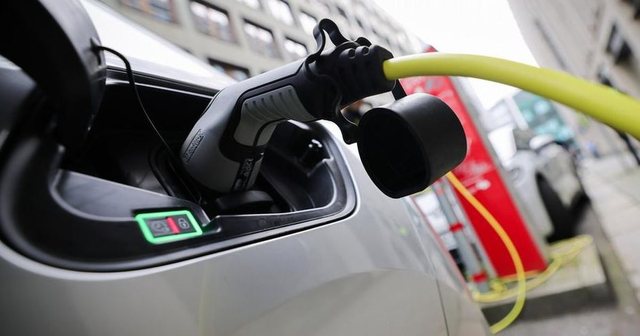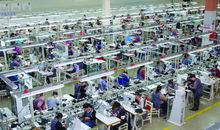
 Flash News
Flash News
Accident at "Shkalla e Tujanit", truck overturns in the middle of the road, driver injured
Vlora by-pass, work delays and cost increases
Milan are expected to give up on the transfer of Granit Xhaka
Inceneratori jashtë funksionit, përfshihet nga flakët fusha e mbetjeve në Elbasan
Accident on the Lezhë-Shëngjin axis, one injured

Electric vehicles will be exempt from Brexit tariffs in EU-UK trade for another three years. This is the proposal of the European Commission. EU member states have not yet reached an agreement.
The European Commission wants to delay Brexit tariffs on electric vehicles and batteries for three years. That is why today he has proposed to member states to exempt them from customs rules in trade with Great Britain during that period. EU member states must now approve the proposal by a qualified majority. This requires the approval of at least 15 of the 27 EU member states. These states must also represent at least 65% of the EU population.
Due to the UK's withdrawal from the EU, the new customs rules would come into force on 1 January 2024. Vehicles with less than 45% of their value added in the EU or the UK would be subject to a tax of 10%. This would affect manufacturers that do not meet the value-added quota for electric vehicles, for example due to a lack of battery production capacity. Under the Commission's proposal, the regulation, which could lead to customs charges, would not apply until 2027.
Great Britain left the European Union at the end of January 2020. The reason for the tariffs are the so-called rules of origin of the Trade and Cooperation Agreement (CCA), which forms the basis of cooperation with the EU from 2021.
Since the free trade agreement was concluded, experts suspected that these rules of origin could become a problem for Great Britain as an economic zone. There are no large battery factories on the island. Only Nissan has a small factory in Sunderland and is investing in a second one there. Hopes for the creation of more factories have not been realized. Britishvolt, which had ambitious plans for a plant in the north of England, ran out of cash in January. Auto companies prefer to invest within the EU or in the more favorable Asian markets.
Cost problems due to customs duties
Without a delay, EU manufacturers would have struggled to supply batteries and other urgently needed parts for electric vehicles to the UK. Initially, Brussels counted on a significant increase in battery production in the European Union itself. But the coronavirus crisis and the war in Ukraine prevented that, according to Brussels.
British carmakers, for their part, feared that because of the tariffs they would no longer be competitive from next year in the important EU export market. German carmakers would also be hit by tariffs on exports to the UK in the future if they are not further suspended. The German Association of the Automotive Industry (VDA) has already described the tariffs as a significant disadvantage for European companies compared to their Asian competitors in the important British market.
Relief in the automotive industry
The president of the association Hildegard Müller reacted positively to the European Commission's announcement on Wednesday: "This decision is the right one and a victory for the climate, industry and consumers." EU states and the UK must now implement the proposal as soon as possible.
Both British car manufacturers and the German car industry will benefit from the expansion of rules of origin, pointed out Marc Lehnfeld of the federal company Germany Trade and Invest (GTAI). Foreign trade in vehicles, parts and engines represents around 22% of German-UK trade this year. This is the most important group of goods.
"The British car industry can now regain confidence," said Lehnfeld. "The German auto industry could also benefit from the change." Germany is the UK's largest supplier of fully electric and hybrid vehicles./DW
Latest news








Golem and Qerret without water at the peak of the tourist season
2025-07-01 21:09:32

Euractiv: Italy-Albania migrant deal faces biggest legal challenge yet
2025-07-01 20:53:38
BIRN: Brataj and Fevziu victims of a 'deepfake' on Facebook
2025-07-01 20:44:00

Vlora by-pass, work delays and cost increases
2025-07-01 20:24:29



Milan are expected to give up on the transfer of Granit Xhaka
2025-07-01 19:41:25


The silent but rapid fading of the towers' euphoria
2025-07-01 18:58:07
Donald Trump's daughter says 'goodbye' to June with photos from Vlora
2025-07-01 18:48:47

Tirana vote recount, Alimehmeti: CEC defended manipulation
2025-07-01 18:15:05

Left Flamurtari, striker signs with another Albanian club
2025-07-01 17:43:14
Accident on the Lezhë-Shëngjin axis, one injured
2025-07-01 17:19:35
June temperature records, Italy limits outdoor work
2025-07-01 17:03:15

Meet Kozeta Miliku, named one of the top five scientists in Canada
2025-07-01 16:32:12
"Arsonist" arrested for repeatedly setting fires in Vlora (NAME)
2025-07-01 16:29:45

The ecological integrity of the Vjosa River risks remaining on paper
2025-07-01 16:09:40
Heat Headache/ Causes, Symptoms and Measures You Should Take
2025-07-01 16:01:13
UN: The world must learn to live with heat waves
2025-07-01 15:54:50

Three cars collide in Tirana, one of them catches fire
2025-07-01 15:38:16

Shehu: Whoever doesn't want Berisha, doesn't want the opposition 'war'!
2025-07-01 15:19:20
Berisha requests the OSCE Assembly: Help my nation vote freely
2025-07-01 15:11:46
Be careful with medications: Some of them can harm your sex life
2025-07-01 15:00:32

'Golden Bullet'/ Lawyers leave the courtroom, Altin Ndoc's trial postponed again
2025-07-01 14:44:52
EU changes leadership, Kosovo in a number of places
2025-07-01 14:40:01
Should we drink a lot of water? Experts are surprised: You risk hyponatremia
2025-07-01 14:30:20



Lëpusha beyond Rama's postcards: A village that is being silently abandoned
2025-07-01 13:41:56
Scorching temperatures in France close the Eiffel Tower
2025-07-01 13:29:35
Media: China, Iran and North Korea, a threat to European security
2025-07-01 13:20:12
Albania drops in global index: Less calm, more insecure
2025-07-01 13:09:35
Road collapses, 5 villages in Martanesh risk being isolated
2025-07-01 13:03:04

Këlliçi: Opposition action to be decided in September
2025-07-01 12:48:49
Four tips for coping with the heat wave
2025-07-01 12:38:53
Car hits pedestrian on Transbalkan road
2025-07-01 12:27:09
Authors of 9 robberies, Erjon Sopoti and Abdullah Zyberi arrested
2025-07-01 12:15:56

He abused his minor daughter, this is a 36-year-old man in custody in Fier
2025-07-01 11:50:34
The constitution of the Kosovo Assembly fails for the 40th time
2025-07-01 11:40:08




EU confirms support for the Western Balkans
2025-07-01 10:50:45
Serious in Fier! Father sexually abuses his minor daughter
2025-07-01 10:32:33
One year since the passing of the colossus of Albanian literature, Ismail Kadare
2025-07-01 10:25:26


They supplied the 'spaçators' with drugs, two young men are arrested in Tirana
2025-07-01 09:54:09
Europe is "scorching", how dangerous are high temperatures?
2025-07-01 09:48:56


Nigel Farage in Albania: but why?
2025-07-01 09:13:12
Xama: The "Partizani" dossier is quite weak and without facts!
2025-07-01 09:04:47

Foreign exchange, the rate at which foreign currencies are sold and bought
2025-07-01 08:35:39
Fabricators again warn of factory closures and job cuts
2025-07-01 08:21:30
Horoscope, what do the stars have in store for you today?
2025-07-01 08:08:59
Scorching hot, temperatures reaching 40°C
2025-07-01 07:57:12
Morning Post/ In 2 lines: What mattered yesterday in Albania
2025-07-01 07:42:59
Recount after May 11, Braho: I had no expectations for massive vote trafficking
2025-06-30 22:54:18

Second hearing on the protected areas law, Zhupa: Unconstitutional and dangerous
2025-06-30 22:18:46



Israel-Iran conflict, Bushati: Albanians should be concerned
2025-06-30 21:32:42

Fuga: Journalism in Albania today in severe crisis
2025-06-30 21:07:11
"There is no room for panic"/ Moore: Serbia does not dare to attack Kosovo!
2025-06-30 20:49:53

Temperatures above 40 degrees, France closes nuclear plants and schools
2025-06-30 20:28:42
Lavrov: NATO is risking self-destruction with new military budget
2025-06-30 20:13:54
Turkey against the "Bektashi state" in Albania: Give up this idea!
2025-06-30 20:03:24

Accused of sexual abuse, producer Diddy awaits court decision
2025-06-30 19:40:44


